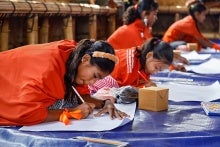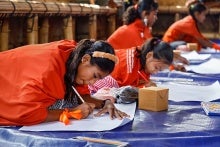Photo: UN Women/Shainur Monir Shimul
Girls’ Rights and the Beijing Declaration and Platform for Action
Equal is better, and agreed. Almost 30 years ago, at the Fourth World Conference on Women in 1995, attended by 17,000 delegates from around the globe, 189 governments adopted the Beijing Declaration and Platform for Action. It remains the world’s most widely endorsed, and visionary agenda for women’s rights. It was also the first global policy document on women that included a specific focus on girls’ rights.
The Beijing Platform for Action promised actions to end discrimination against girls and negative attitudes and stereotypes that hold them back from education and opportunities. It emphasized the need to advance girls’ access to Science, Technology, Engineering and Mathematics (STEM) and skills training. The Platform for Action provided a blueprint of actions that could improve girls’ health, protect them from violence, and boost their voice, choice, and participation. These actions remain relevant and urgent today.
Key facts on girls’ rights
Girls’ Rights, Girl’s Vision, Our Future
Girls in ICT
More girls may be in school today than ever before, but they do not enjoy the same opportunities as boys, especially in science, technology, engineering and mathematics (STEM). Women make up only 35 per cent of STEM graduates and just 29 per cent of STEM workers. Jobs of the future are missing girls, and at great cost. Closing the digital gender gap in the next five years could yield $524 billion for the global economy.
When Natacha Sangwa from Rwanda wanted to learn computer coding, people in her life asked, ‘do you really think you’ll be able to handle it?’ Coding needs time and focus that they believed girls lacked. After all, men hold most of the tech jobs.
“I was motivated to prove them wrong by learning how to code and pursuing a career in tech,” said Sangwa. She is part of the African Girls Can Code Initiative (AGCCI), spearheaded by UN Women, the International Telecommunication Union, and the African Union in 11 countries, including Rwanda. In coding camps organized by the programme, participating girls learn about coding, robotics, and gender equality.
“I believe that providing young girls with female role models in tech and motivating them is essential to increase representation of women in the field,” said Sangwa. Since attending the coding camp, Sangwa is excited to become a peer mentor for other girls.
“We are the future of technology, and we can achieve a lot. Do not let anyone tell you that you cannot succeed in technology because of your gender,” said Sangwa. Read her full story here.
Photo: UN Women/Rossana Fraga
Gender-equal Olympics, changing the game
The Paris 2024 Olympic and Paralympic Games made history this year with an equal number of men and women competing. UN Women spoke to girls in Brazil and Argentina, and they shared their vision for gender equality in sports.
Sport teaches girls the skills they need to advance in life. Girls who play sports develop self-esteem, tend to stay in school longer, delay pregnancy, and get better jobs. Eighty per cent of female Fortune 500 CEOs played sports in their formative years.
Yet, by the age of 14, girls drop out of sports at twice the rate of boys because of social norms, the lack of safe spaces, and insufficient investment in sport programmes for girls.
Rebeca Cristina Cassiano dos Anjos from Rio de Janeiro, Brazil, started swimming when she was four years old. However, staying in sport was a struggle.
“It’s a daily struggle against prejudice, sexism, lack of sponsorship and encouragement,” said Rebecca. “Inequalities start from childhood… Girls are given dolls and kitchen utensils and expected to learn how to devote themselves to their home and family, while boys are given footballs and enrolled in football programmes.”
She is among a cohort of 15 young women from Brazil and another 30 from Argentina who recently completed a sport programme sponsored by UN Women and the International Olympic Committee (IOC). Under the “OWLA Participate” initiative, they developed advocacy skills, met with several high-profile decision-makers in the sport ecosystem, and proposed strategies to tackle the low representation of women in sport management positions, lack of safe spaces for girls and women in sport, and racism. Read more about their perspectives.
End period poverty, support girls in STEM
Maka Chikowero was 15 years old when she founded a non-profit organization, MTC Educate A Girl Inc, to help rural Zimbabwean girls access education, sport, and develop their leadership skills.
Period poverty makes rural girls drop out of school, says Chikowero: “Young women and girls are missing out on life because of their period. They are having to stop going to work, school, sporting events, take leadership opportunities, because they don’t have access to menstrual products that they need.”
Chikowero is from Zimbabwe and the United States of America, an athlete, and youth activist. She attended the 69th session of the UN Commission on the Status of Women this year to advocate for policies and funding to support girls’ rights.
“Education is a tool for getting women and girls out of poverty, especially in the rural areas. I have seen the proof,” she said.
“Investing in girls’ tertiary education and creating support systems for them is critical. Girls are often pushed out of STEM education and not encouraged to pursue STEM just because they are girls. Teachers have to do their part in encouraging girls to pursue STEM from an early age so that they believe that they deserve to be in those spaces.”
Photo Courtesy of Sahithi Radha
Girls leading climate action
Electronic waste is the fastest-growing stream of waste in India. According to the Ministry of Environment, Forest and Climate Change of India, India generated 1.6 million tons of e-waste in 2021 and 2022, and only 32.92 per cent was recycled.
Sahithi Radha, a 16-year-old environmental leader from Hyderabad, India, realized the gravity of the problem as she watched sanitation workers on the streets, many of whom were children, being impacted by mishandled e-waste.
“E-waste contains toxic carcinogens such as mercury and arsenic. The damage caused when these substances contaminate our ecosystem is irreparable,” she said.
In 2022, Radha founded E-Cycl India, which recycles e-waste and raises public awareness about responsible e-waste disposal. E-Cycl India has recycled over 10,000 kilograms of e-waste through their collection and recycling drives, supporting the lives of 100 sanitation workers to date. It has engaged hundreds of young people through student-led awareness sessions in schools and workplaces, and through social media.
For Radha, it is important to cultivate a sense of hope and confidence in young people about climate action. “No matter how small or insignificant you think your action is, it matters,” she said. “Stay educated, stay up to date. The only thing that cannot be taken away from you is your intelligence, and there is no fight against climate change without it.”
Radha is working with UN Women and the UN Environment Programme (UNEP) on EmPower: Women for Climate-Resilient Programme in India. Learn more about girls leading climate action in India and Pakistan.

